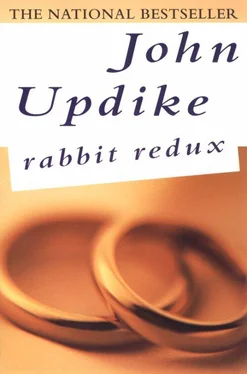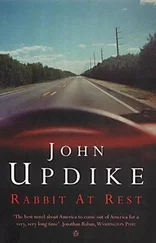The boy leans forward and murmurs to Rabbit, "You want ass, right? You can have her. Fifty gets you her all night, all ways you can think up. She knows a lot."
Sunk in her music, Rabbit is lost. He shakes his head and says, "She's too good."
"Good, man; she got to live, right? This place don't pay her shit."
Babe has become a railroad, prune-head bobbing, napkin of jewels flashing blue, music rolling through crazy places, tunnels of dissonance and open stretches of the same tinny thin note bleeding itself into the sky, all sad power and happiness worn into holes .like shoe soles. From the dark booths around voices call out in a mutter "Go Babe" and "Do it, do it." The spidery boys in the adjacent room are frozen around the green felt. Into the mike that is there no bigger than a lollipop she begins to sing, sings in a voice that is no woman's voice at all and no man's, is merely human, the words of Ecclesiastes. A time to be born, a time to die. A time to gather up stones, a time to cast stones away. Yes. The Lord's last word. There is no other word, not really. Her singing opens up, grows enormous, frightens Rabbit with its enormous black maw of truth yet makes him overjoyed that he is here; he brims with joy, to be here with these black others, he wants to shout love through the darkness of Babe's noise to the sullen brother in goatee and glasses. He brims with this itch but does not spill. For Babe stops. As if suddenly tired or insulted Babe breaks off the song and shrugs and quits.
That is how Babe plays.
She comes back to the table stooped, trembling, nervous, old.
"That was beautiful, Babe," Rabbit tells her.
"It was," says another voice. A small white girl is standing there prim, in a white dress casual and dirty as smoke.
"Hey. Jill," Buchanan says.
"Hi Buck. Skeeter, hi."
So Skeeter is his name. He scowls and looks at the cigarette of which there is not even butt enough to call a roach.
` Jilly-love," Buchanan says, standing until his thighs scrape the table edge, "allow me to introduce. Harry the Rabbit Angstrom, he works at the printing plant with me, along with his daddy."
"He has a daddy?" Jill asks, still looking at Skeeter, who will not look at her.
"Jilly, you go sit in here where I am," Buchanan says. "I'll go get a chair from Rufe."
"Down, baby," Skeeter says. "I'm splitting." No one offers to argue with him. Perhaps they are all as pleased as Rabbit to see him go.
Buchanan chuckles, he rubs his hands. His eyes keep in touch with all of them, even though Babe seems to be dozing. He says to Jill, "How about a beverage? A 7-Up? Rufe can make a lemonade even."
"Nothing," Jill says. Teaparty manner. Hands in lap. Thin arms. Freckles. Rabbit scents in her the perfume of class. She excites him.
"Maybe she'd like a real drink," he says. With a white woman here he feels more in charge. Negroes, you can't blame them, haven't had his advantages. Slave ships, cabins, sold down the river, Ku Klux Klan, James Earl Ray: Channel 44 keeps having these documentaries all about it.
"I'm under age," Jill tells him politely.
Rabbit says, "Who cares?"
She answers, "The police."
"Not up the street they wouldn't mind so much," Buchanan explains, "if the girl halfway acted the part, but down here they get a touch fussy."
"The fuzz is fussy," Babe says dreamily. "The fuzz is our fussy friends. The fuzzy motherfuckers fuss."
"Don't, Babe," Jill begs. "Don't pretend."
"You let your old black mamma have a buzz on," Babe says. "Don't I take good care of you mostly?"
"How would the police know if this kid has a drink?" Rabbit asks, willing to be indignant.
Buchanan makes his high short wheeze. "Friend Harry, they'd just have to turn their heads."
"There're cops in here?"
"Friend" – and from the way he sidles closer Harry feels he's found another father– "if it weren't for po-lice spies, poor Jimbo's wouldn't sell two beers a night. Po-lice spies are the absolute backbone of local low life. They got so many plants going, that's why they don't dare shoot in riots, for fear of killing one of their own."
"Like over in York."
Jill asks Rabbit, "Hey. You live in Brewer?" He sees that she doesn't like his being white in here, and smiles without answering. Screw you, little girl.
Buchanan answers for him. "Lady, does he live in Brewer? If he lived any more in Brewer he'd be a walking advertisement. He'd be the Owl Pretzel owl. I don't think this fella's ever gotten above Twelfth Street, have you Harry?"
"A few times. I was in Texas in the Army, actually."
"Did you get to fight?" Jill asks. Something scratchy here, but maybe like a kitten it's the way of making contact.
"I was all set to go to Korea," he says. "But they never sent me." Though at the time he was grateful, it has since eaten at him, become the shame of his life. He had never been a fighter but now there is enough death in him so that in a way he wants to kill.
"Now Skeeter," Buchanan is saying, "he's just back from Vietnam."
"That's why he so rude," Babe offers.
"I couldn't tell if he was rude or not," Rabbit confesses.
"That's nice," Buchanan says.
"He was rude," Babe says.
Jill's lemonade arrives. She is still girl enough to look happy when it is set before her: cakes at the teaparty. Her face lights up. A crescent of lime clings to the edge of the glass; she takes it off and sucks and makes a sour face. A child's plumpness has been drained from her before a woman's bones could grow and harden. She is the reddish type of fair; her hair hangs dull, without fire, almost flesh-color, or the color of the flesh of certain soft trees, yews or cedars. Harry feels protective, timidly. In her tension of small bones she reminds him of Nelson. He asks her, "What do you do, Jill?"
"Nothing much," she says. "Hang around." It had been square of him to ask, pushing. The blacks fit around her like shadows.
"Jilly's a poor soul," Babe volunteers, stirring within her buzz. "She's fallen on evil ways." And she pats Rabbit's hand as if to say, Don't you fall upon these ways.
"Young Jill," Buchanan clarifies, "has run away from her home up there in Connec-ticut."
Rabbit asks her, "Why would you do that?"
"Why not? Let freedom ring."
"Can I ask how old you are?"
"You can ask."
"I'm asking."
Babe hasn't let go of Rabbit's hand; with the fingernail of her index finger she is toying with the hairs on the back of his fist. It makes his teeth go cold, for her to do that. "Not so old you couldn't be her daddy," Babe says.
He is beginning to get the drift. They are presenting him with this problem. He is the consultant honky. The girl, too, unwilling as she is, is submitting to the interview. She inquires of him, only partly parrying, "How old are you?"
"Thirty-six."
"Divide by two."
"Eighteen, huh? How long've you been on the run? Away from your parents."
"Her daddy dead," Buchanan interposes softly.
"Long enough, thank you." Her face pales, her freckles stand out sharply: blood-dots that have dried brown. Her dry little lips tighten; her chin drifts toward him. She is pulling rank. He is Penn Villas, she is Penn Park. Rich kids make all the trouble.
"Long enough for what?"
"Long enough to do some sick things."
"Are you sick?"
"I'm cured."
Buchanan interposes, "Babe helped her out."
"Babe is a beautiful person," Jill says. "I was really a mess when Babe took me in."
` Jilly is my sweetie," Babe says, as suddenly as in playing she moves from one tune to another, ` Jilly is my baby-love and I'm her mamma-love," and takes her brown hands away from Harry's to encircle the girl's waist and hug her against the roostercomb-red of her dress; the two are women, though one is a prune and the other a milkweed. Jill pouts in pleasure. Her mouth is lovable when it moves, Rabbit thinks, the lower lip bumpy and dry as if chapped, though this is not winter but the humid height of summer.
Читать дальше












